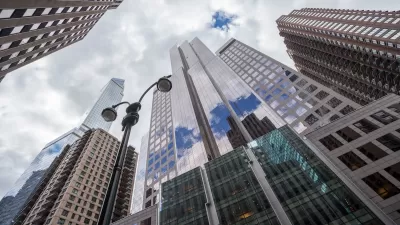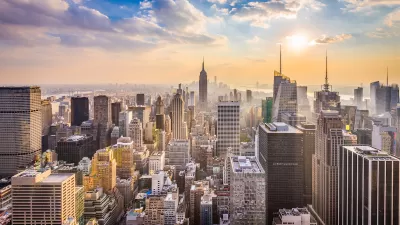The first of three elements of the City of Yes rezoning proposal aims to remove barriers to building green infrastructure.

The New York City Planning Commission (CPC) approved the first of Mayor Eric Adams’ ‘City of Yes’ rezoning proposals aimed at reducing carbon emissions. The proposal includes 17 citywide zoning changes that are designed to remove “barriers to greener energy, buildings, transportation, and water and waste systems,” reports Jessica Jones-Gorman on SILive.com.
In practice, the proposal, dubbed City of Yes for Carbon Neutrality, means “environmentally friendly retrofits for over 50,000 buildings and 1 million homes, the allocation of over 400 million square feet for electric vehicle charging, and the modernization of the city’s water, compost and recycling regulations -- all measures that CPC officials say are critical steps for New York City to reach its ambitious environmental goals.”
Some Staten Island officials have expressed concern about the proposal to allow energy storage infrastructure in residential areas. “The physical design of these facilities we have seen during the process, and the uncertain nature of the safety of them creates a whole host of issues that clearly is inconsistent with residential character and use,” said CPC Commissioner Alfred Cerullo. “The borough president noted that Staten Island elected officials have stated publicly that the current approach will decrease the quality of life for many families, potentially increase safety issues for both residents and firefighters, and diminish property values.”
FULL STORY: First ‘City of Yes’ zoning change approved by City Planning Commission, despite Staten Island pushback

Planetizen Federal Action Tracker
A weekly monitor of how Trump’s orders and actions are impacting planners and planning in America.

Maui's Vacation Rental Debate Turns Ugly
Verbal attacks, misinformation campaigns and fistfights plague a high-stakes debate to convert thousands of vacation rentals into long-term housing.

San Francisco Suspends Traffic Calming Amidst Record Deaths
Citing “a challenging fiscal landscape,” the city will cease the program on the heels of 42 traffic deaths, including 24 pedestrians.

Defunct Pittsburgh Power Plant to Become Residential Tower
A decommissioned steam heat plant will be redeveloped into almost 100 affordable housing units.

Trump Prompts Restructuring of Transportation Research Board in “Unprecedented Overreach”
The TRB has eliminated more than half of its committees including those focused on climate, equity, and cities.

Amtrak Rolls Out New Orleans to Alabama “Mardi Gras” Train
The new service will operate morning and evening departures between Mobile and New Orleans.
Urban Design for Planners 1: Software Tools
This six-course series explores essential urban design concepts using open source software and equips planners with the tools they need to participate fully in the urban design process.
Planning for Universal Design
Learn the tools for implementing Universal Design in planning regulations.
Heyer Gruel & Associates PA
JM Goldson LLC
Custer County Colorado
City of Camden Redevelopment Agency
City of Astoria
Transportation Research & Education Center (TREC) at Portland State University
Jefferson Parish Government
Camden Redevelopment Agency
City of Claremont





























